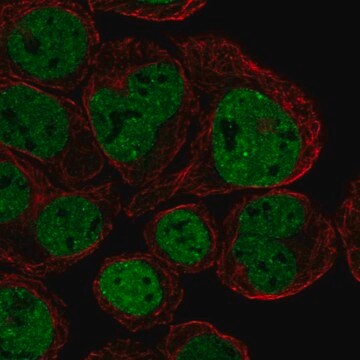HPA040361
Anti-CX3CL1 antibody produced in rabbit
Prestige Antibodies® Powered by Atlas Antibodies, affinity isolated antibody, buffered aqueous glycerol solution
别名:
Anti-Abcd-3, Anti-C3xkine, Anti-Chemokine (c-x3-c motif) ligand 1, Anti-Cxc3, Anti-Cxc3c, Anti-Fractalkine, Anti-Neurotactin, Anti-Ntn, Anti-Scyd1
登录查看公司和协议定价
所有图片(1)
About This Item
推荐产品
生物源
rabbit
品質等級
共軛
unconjugated
抗體表格
affinity isolated antibody
抗體產品種類
primary antibodies
無性繁殖
polyclonal
產品線
Prestige Antibodies® Powered by Atlas Antibodies
形狀
buffered aqueous glycerol solution
物種活性
human
技術
immunohistochemistry: 1:500- 1:1000
免疫原序列
GVTKCNITCSKMTSKIPVALLIHYQQNQASCGKRAIILETRQHRLFCADPKEQWVKDAMQHLDRQAAALTRNGGTFEKQIGEVKPRTTPAAGGMDESVVLE
UniProt登錄號
運輸包裝
wet ice
儲存溫度
−20°C
目標翻譯後修改
unmodified
基因資訊
human ... CX3CL1(6376)
一般說明
C-X3-C motif chemokine ligand 1(CX3CL1), also known as fractalkine (FKN), is encoded by the gene mapped to human chromosome 16q21. The encoded protein acts as a chemotactic cytokine in a soluble form, or acts as a binding molecule in a membrane-attached form. CX3CL1 is characterized by a mucin-like stalk containing chemokine domain and single transmembrane domain with a short intracellular C-terminal. CX3CL1 belongs to the CX3C chemokine subfamily.
免疫原
chemokine (C-X3-C motif) ligand 1 recombinant protein epitope signature tag (PrEST)
應用
Anti-CX3CL1 antibody produced in rabbit has been used in tissue microarray (TMA) immunostaining.
生化/生理作用
CX3CL1 interacts with its cognate receptor CX3CR1 and stimulates chemotaxis of macrophages to apoptotic lymphocytes. The protein also facilitates inflammatory processes in the central nervous system (CNS). CX3CL1 has been implicated in the molecular mechanism that controls cell adhesion, migration and survival of human prostate cancer cells. Hence, the protein has potential therapeutic approach to treatment of prostate cancer. Elevated expression of serum CX3CL1 has been observed in postmenopausal osteoporotic patients. Thus, it acts as a potential diagnostic marker and therapeutic target for anti-resorptive treatment in osteoporosis patients.
特點和優勢
Prestige Antibodies® are highly characterized and extensively validated antibodies with the added benefit of all available characterization data for each target being accessible via the Human Protein Atlas portal linked just below the product name at the top of this page. The uniqueness and low cross-reactivity of the Prestige Antibodies® to other proteins are due to a thorough selection of antigen regions, affinity purification, and stringent selection. Prestige antigen controls are available for every corresponding Prestige Antibody and can be found in the linkage section.
Every Prestige Antibody is tested in the following ways:
Every Prestige Antibody is tested in the following ways:
- IHC tissue array of 44 normal human tissues and 20 of the most common cancer type tissues.
- Protein array of 364 human recombinant protein fragments.
聯結
Corresponding Antigen APREST81765
外觀
Solution in phosphate buffered saline, pH 7.2, containing 40% glycerol and 0.02% sodium azide.
法律資訊
Prestige Antibodies is a registered trademark of Merck KGaA, Darmstadt, Germany
免責聲明
Unless otherwise stated in our catalog or other company documentation accompanying the product(s), our products are intended for research use only and are not to be used for any other purpose, which includes but is not limited to, unauthorized commercial uses, in vitro diagnostic uses, ex vivo or in vivo therapeutic uses or any type of consumption or application to humans or animals.
未找到合适的产品?
试试我们的产品选型工具.
儲存類別代碼
10 - Combustible liquids
水污染物質分類(WGK)
WGK 1
閃點(°F)
Not applicable
閃點(°C)
Not applicable
WangMi Liu et al.
Archivum immunologiae et therapiae experimentalis, 64(5), 371-383 (2016-04-22)
Chemokines are a family of small 8-10 kDa inducible cytokines. Initially characterized as chemotactic factors, they are now considered to affect not just cellular recruitment. CX3CL1 is a unique chemokine that can exist in a soluble form, as a chemotactic cytokine
Lucy A Truman et al.
Blood, 112(13), 5026-5036 (2008-09-19)
Cells undergoing apoptosis are efficiently located and engulfed by phagocytes. The mechanisms by which macrophages, the professional scavenging phagocytes of apoptotic cells, are attracted to sites of apoptosis are poorly defined. Here we show that CX3CL1/fractalkine, a chemokine and intercellular
Yi-Ding Chen et al.
British journal of biomedical science, 73(3), 121-128 (2016-08-02)
The chemokine (C-X3-C motif) ligand 1 (CX3CL1), also called fractalkine (FKN), has recently been reported to be involved in osteoclastogenic process and pathological bone destruction. This study aimed to investigate the link between serum CX3CL1/FKN levels with disease progression of
Gladys Morrison et al.
Stem cell research, 16(1), 140-148 (2016-01-17)
Differentiated cells retain the genetic information of the donor but the extent to which phenotypic differences between donors or batches of differentiated cells are explained by variation introduced during the differentiation process is not fully understood. In this study, we
Jiebing Tang et al.
Oncology reports, 35(2), 1153-1162 (2016-01-01)
Epithelial-to-mesenchymal transition (EMT) endows cancer cells with enhanced invasive and metastatic potential during cancer progression. Fractalkine, also known as chemokine (C-X3-C motif) ligand 1 (CX3CL1), the only member recognized so far that belongs to the CX3C chemokine subfamily, was reported
我们的科学家团队拥有各种研究领域经验,包括生命科学、材料科学、化学合成、色谱、分析及许多其他领域.
联系技术服务部门